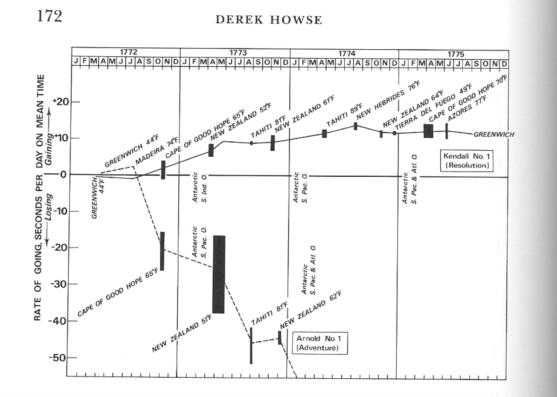
NavList:
A Community Devoted to the Preservation and Practice of Celestial Navigation and Other Methods of Traditional Wayfinding
Re: How Many Chronometers?
From: George Huxtable
Date: 2009 May 6, 22:55 +0100
From: George Huxtable
Date: 2009 May 6, 22:55 +0100
Jim Wilson wrote- | How about a log which keeps error and rate. John Harrison's chronometer | had to be accurate for three years at sea for him to win the prize. And | there were zero sources of time ticks then. That's a common misunderstanding. But the test that was applied to Harrison's chronometer H4 was between Portsmouth and Barbados, a voyage of 7 weeks, over which an error of 38.6 seconds had accumulated. Cook took a different chronometer, a copy made by Kendall (K1), around the World on "Resolution" on his second circumnavigation. There is much misunderstanding about that too, partly the result of the Sobel book "Longitude". A useful analysis was made of its performance by Derek Howse, in a section, "Navigation and astronomy", of the book "Background to Discovery", ed. Howse (1990). I attach a plot. Over most of the period, it was gaining at over 10 seconds per day. Over a year, that puts it an hour out, or 15º of longitude (= 900 miles in the tropics). Over two years, twice that. It was only by checking the error, against lunars or Jupiter satellites, at each stopping-point, where the rate could also be checked by star transits, that Cook was able to keep its inaccuracy within bounds. As long as that was done, it became a useful tool, and he was delighted to have it aboard. The Arnold chronometer, carried on the consort "Adventure", behaved much worse, as the plot shows. Jim added, in another posting, "I guess I thought that a chronometer was defined as a clock with a constant rate of change." Alas, there's no such thing. Every chronometer has some temperature dependence, and the aim is to minimise that over the widest possible working range. And every mechanical chronometer is subject to wear, and to deterioration of its lubrication, which changes its rate over time. It became standard practice, whenever a long stay in port occurred, to return the instrument to an expert for cleaning and re-rating. By the way, there was a wonderful picture, a few weeks back, occupying a double page in the Guardian. Harrison's original chronometer, the enormous H1, had failed, after all these working years. One of the four coil springs, which contol the motion of its balance, had broken; presumably, from metal fatigue. The picture showed from above Jonathan Betts, curator of the horological gallery at the National Maritime Museum, surrounded by the component parts of the clock like an enormous exploded diagram. I do hope he manages to get it together, to run for a further 250 years. George. contact George Huxtable, at george@hux.me.uk or at +44 1865 820222 (from UK, 01865 820222) or at 1 Sandy Lane, Southmoor, Abingdon, Oxon OX13 5HX, UK. --~--~---------~--~----~------------~-------~--~----~ Navigation List archive: www.fer3.com/arc To post, email NavList@fer3.com To , email NavList-@fer3.com -~----------~----~----~----~------~----~------~--~---







